译林牛津版高中英语必修四 Unit1 Advertising Direct speech and reported speech课件(共35张)
文档属性
| 名称 | 译林牛津版高中英语必修四 Unit1 Advertising Direct speech and reported speech课件(共35张) |  | |
| 格式 | zip | ||
| 文件大小 | 387.2KB | ||
| 资源类型 | 教案 | ||
| 版本资源 | 牛津译林版 | ||
| 科目 | 英语 | ||
| 更新时间 | 2020-01-01 22:05:18 | ||
图片预览

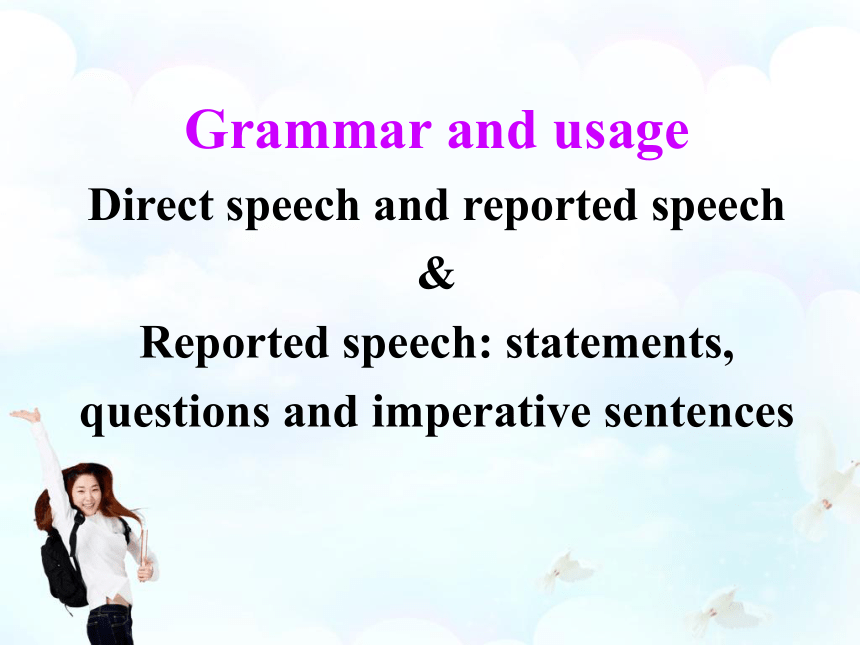
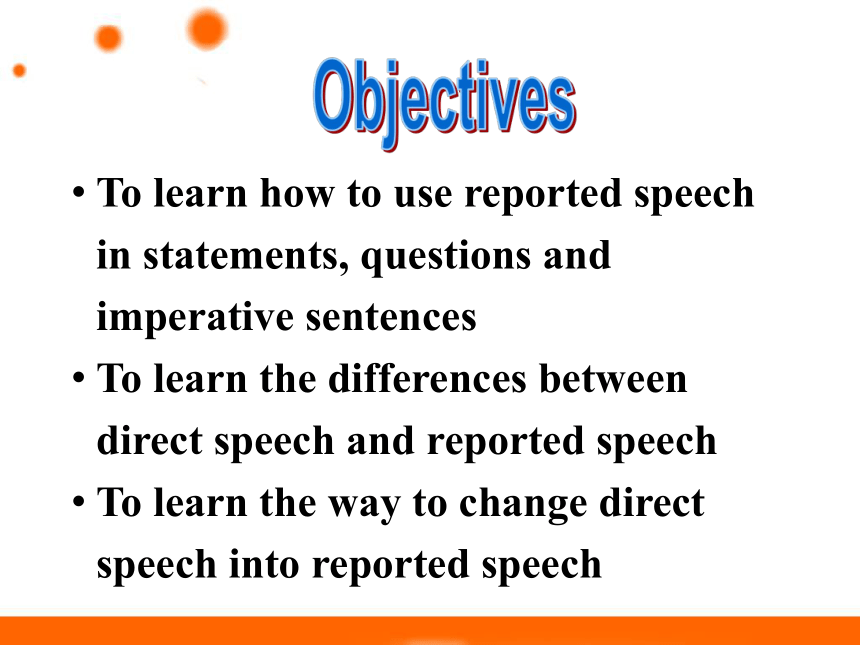
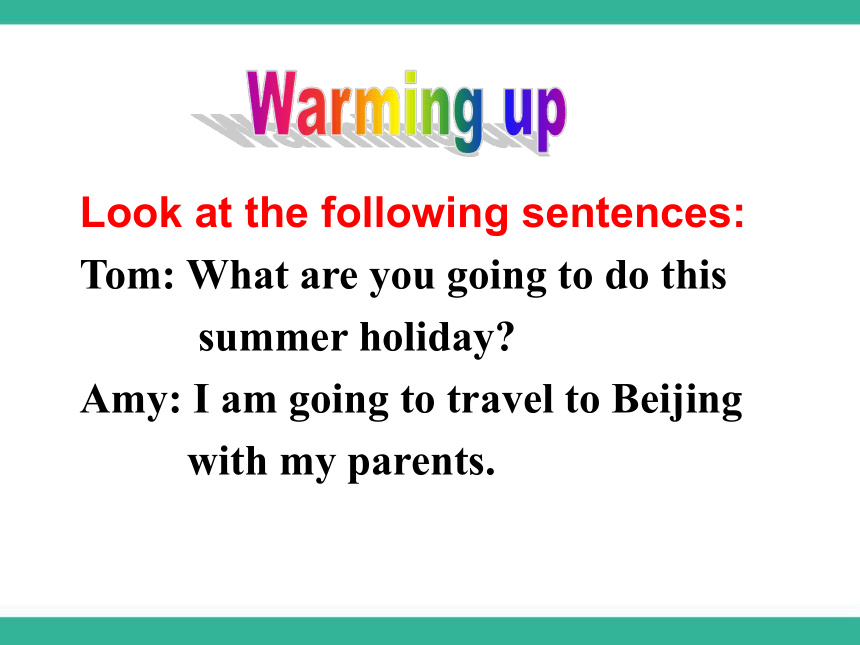
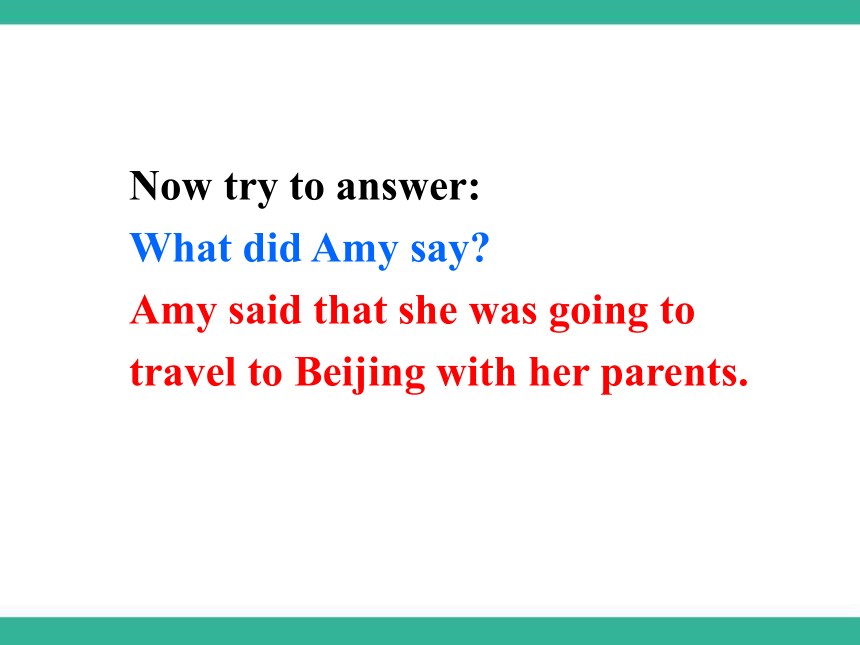
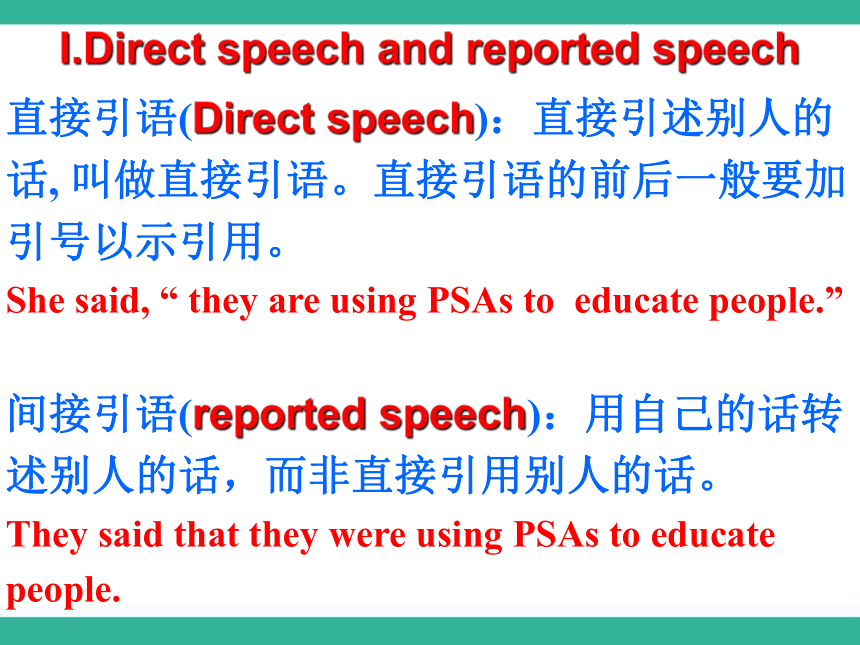


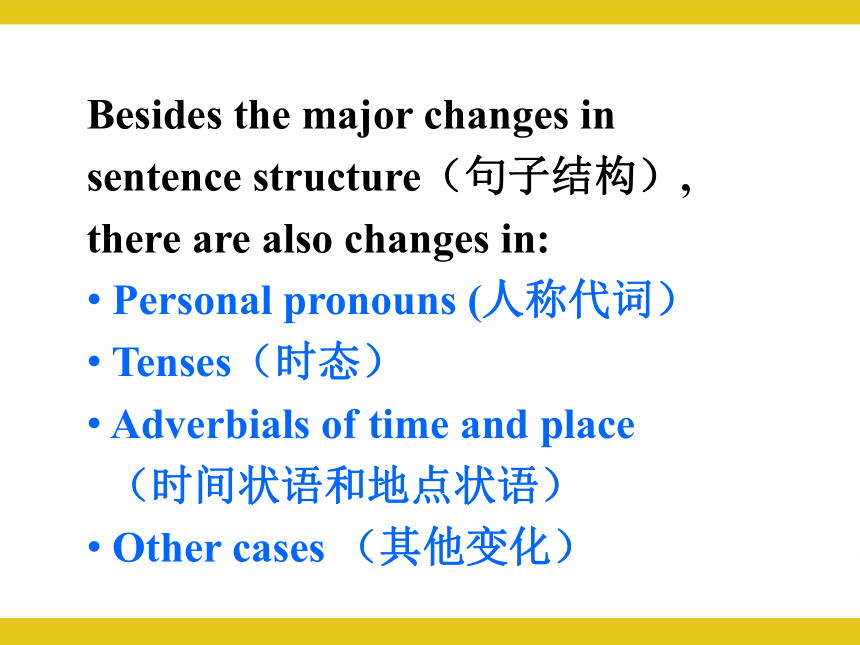
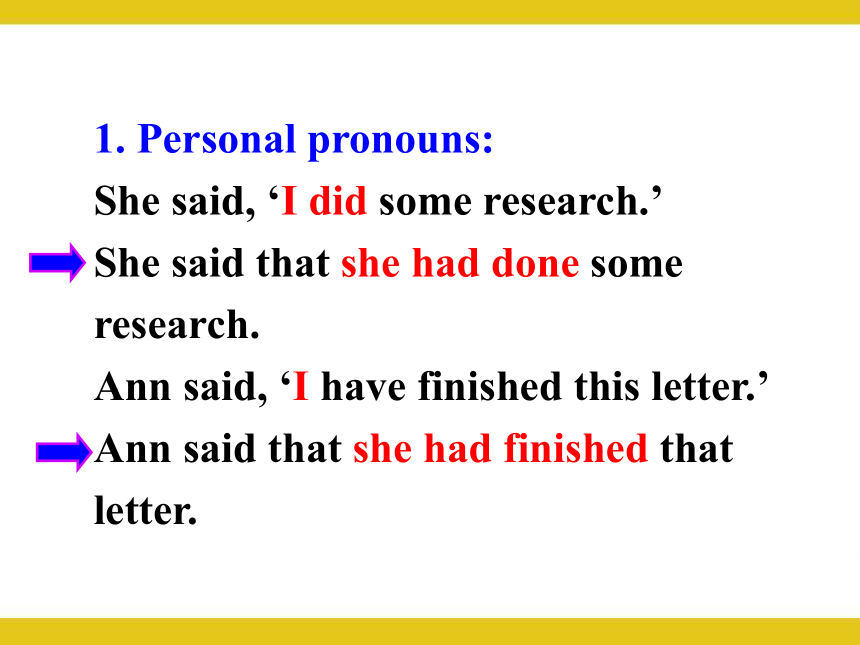
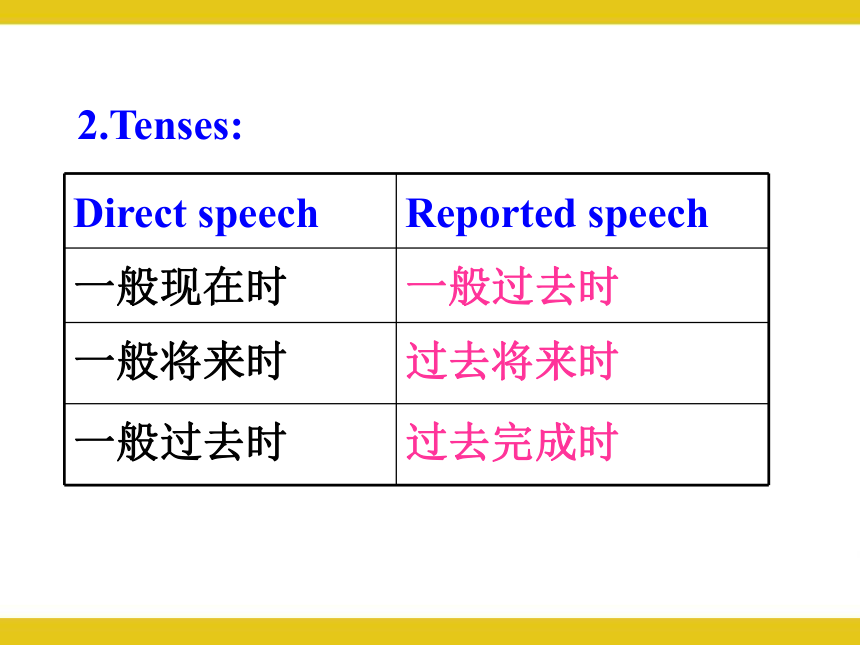
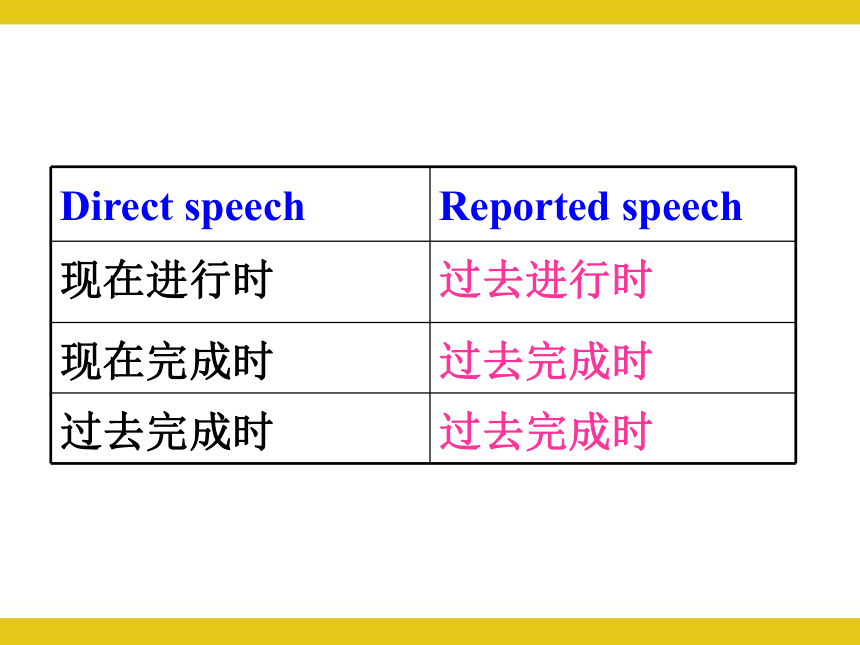
文档简介
课件35张PPT。Unit 1 Advertising Grammar and usage
Direct speech and reported speech &
Reported speech: statements, questions and imperative sentences To learn how to use reported speech in statements, questions and imperative sentences
To learn the differences between direct speech and reported speech
To learn the way to change direct speech into reported speech ObjectivesLook at the following sentences:
Tom: What are you going to do this
summer holiday?
Amy: I am going to travel to Beijing
with my parents.Warming upNow try to answer:
What did Amy say?
Amy said that she was going to travel to Beijing with her parents. I.Direct speech and reported speech直接引语(Direct speech):直接引述别人的话, 叫做直接引语。直接引语的前后一般要加引号以示引用。
She said, “ they are using PSAs to educate people.”
间接引语(reported speech):用自己的话转述别人的话,而非直接引用别人的话。
They said that they were using PSAs to educate people.II. How can we change direct speech into reported speech?
We can change direct speech into reported speech by using an object clause or an infinitive phrase.For example:
He said, ‘I’m used to such embarrassing comments.’
He said that he was used to such embarrassing comments.“We must not give up in the face of pressure!” she said.
She encouraged us not to give up in the face of pressure.Besides the major changes in sentence structure(句子结构), there are also changes in:
Personal pronouns (人称代词)
Tenses(时态)
Adverbials of time and place
(时间状语和地点状语)
Other cases (其他变化)1. Personal pronouns:
She said, ‘I did some research.’
She said that she had done some research.
Ann said, ‘I have finished this letter.’
Ann said that she had finished that letter. 2.Tenses:“Light travels at a great speed,” said Ms Li.
Ms Li said that light travels at a great speed.Tips:We do not change the tense when we report a proverb or a fact that doesn’t change over time.3. Adverbials of time and place:
e.g. Tom said, ‘I am working here
today.’
Tom said he was working there
that day.The following table shows other examples:that day/yesterday, etc.the next day/the following day, etc.the day before/ the previous day, etc.the month after/the following montha week before/ a week earlier, etc.Other cases:
Some more examples of the changes:thatthosegoRead the advertisement and complete the letter on Page 9.
Answers:
1. _______ 2. ________ 3. __________
4. _______ 5. ________ 6. __________
7. _______ 8. ________ 9. _________
10. ______waswould behad readthatwouldhad boughtthatwouldthoseherReported speech:
statements, questions and imperative sentences1. Statements(陈述句)
直接引语如果是陈述句,变成间接引语时,我们用连词that引导的名词性从句叙述所陈述的内容。that在口语中可以省略
she said, “advertisements are almost everywhere nowadays.”
She said (that) advertisements were almost everywhere nowadays.There are more reporting verbs other than say and tell:advise explain insist promise
announce suggest warne.g. The write explained that PSAs were
often run for free.直接引语如果是一般疑问句,变成间接引语的时,我们用连词whether或者if引导的名词性从句叙述所陈述的问题。
e.g. Matt asked Ann, ‘Does Jason deserve
this ward?’
Matt asked Ann whether/if Jason
deserved this award.2. Questions直接引语如果是特殊疑问句,变成间接引语时,我们用原来的疑问词引导名词性从句叙述所陈述的问题。
e.g. ‘Where did you find the
advertisements for jobs abroad?’
Bill asked.
Bill asked where I had found the
advertisements for jobs abroad.3. Imperative sentences 直接引语如果是祈使句,变为间接引语时,要将祈使句的动词变为带to的不定式,并在不定式的前面根据句子的意思加上tell, ask等动词,其句型是 tell / ask sb. (not) to do sth.
e.g. The candidate said to the manager,
“Please give me five minutes for
preparation.’
The candidate asked the manager to
give him five minutes for preparation. There are other verbs that can be used
in this structure to report imperative
sentences:advise encourage invite recommend warne.g. ‘Don’t believe every advertisement
you read,’ Michelle said to me.
Michelle advised me not to believe
every advertisement I read.Read the advertising tips on Page 11 and report each of them to your boss.
Answers:
2. The expert encourages us to
_______________________________.
3. The expert recommends that
________________________________.use interesting and attractive photoswe (should) use eye-catching logos4. The expert suggests that __________
_______________________________
_______________________________.
5. The expert tells us to _____________
_________________________________.we (should)make the slogans short and easymake good useof colours to attract people’s attentionto remember将下列直接引语变为间接引语。
1. Henry said,“There is an excellent band playing later on.”
→_____________________________________________________________
2. Ann told Rick,“I bought this dress here”.
→____________________________________________________________Henry said (that) there was an excellent band playing later on. Ann told Rick (that) she had bought that dress there. 3. My father said to me,“Don’t drink and drive.”
→_______________________________________________________
4.“Have you got any thoughts about tomorrow?” he asked me.
→______________________________________________________________________My father told me not to drink and drive. He asked me if / whether I had got any thoughts about the next / following day. 5. “ When is the aircraft supposed to arrive? ”I asked them.
→__________________________________________________________________
6. “Please post the letter for me on your way to school, Linda,”said Carl.
→__________________________________________________________________I asked them when the aircraft was supposed to arrive. Carl asked Linda to post the letter for him on her way to school. 总 结 如果直接引语是一个陈述句,变成间接
引语时用that引导,有时也可省略。
e.g. She said, ‘Father, the boy is very
naughty now.’
She told her father (that) the boy
was very naughty then.2. 如果直接引语是客观真理,变为间
接引语时,时态不变。
e.g. ‘Light travels much faster than
sound,’ she said to me yesterday.
She told me the day before that
light travels much faster than
sound.3. 如果直接引语中有明确表示过去的
时间状语,在变为间接引语时,一
般过去时不必变为过去完成时。
e.g. He said, ‘The great inventor was
born in 1884.’
He told me that the great
inventor was born in 1884.5. 如果直接引语是特殊疑问句,变为间接
引语时,仍用该特殊疑问词,用陈述句
语序。
e.g. She asked me, ‘When will the
advertisements be on air?’
She asked me when the
advertisements would be on air.6. 转述祈使句时使用该结构: 转述
动词(ask/ tell/ order/ advise/ remind/
warn/ insist/ suggest/ invite/
encourage…) +宾语+ (not) to do
e.g. ‘Go and see a doctor after class,’
my teacher said to me.
My teacher advised me to go and
see a doctor after class. Finish Part C2 on Page 92 of the
Workbook.
Preview the Task.Homework
Direct speech and reported speech &
Reported speech: statements, questions and imperative sentences To learn how to use reported speech in statements, questions and imperative sentences
To learn the differences between direct speech and reported speech
To learn the way to change direct speech into reported speech ObjectivesLook at the following sentences:
Tom: What are you going to do this
summer holiday?
Amy: I am going to travel to Beijing
with my parents.Warming upNow try to answer:
What did Amy say?
Amy said that she was going to travel to Beijing with her parents. I.Direct speech and reported speech直接引语(Direct speech):直接引述别人的话, 叫做直接引语。直接引语的前后一般要加引号以示引用。
She said, “ they are using PSAs to educate people.”
间接引语(reported speech):用自己的话转述别人的话,而非直接引用别人的话。
They said that they were using PSAs to educate people.II. How can we change direct speech into reported speech?
We can change direct speech into reported speech by using an object clause or an infinitive phrase.For example:
He said, ‘I’m used to such embarrassing comments.’
He said that he was used to such embarrassing comments.“We must not give up in the face of pressure!” she said.
She encouraged us not to give up in the face of pressure.Besides the major changes in sentence structure(句子结构), there are also changes in:
Personal pronouns (人称代词)
Tenses(时态)
Adverbials of time and place
(时间状语和地点状语)
Other cases (其他变化)1. Personal pronouns:
She said, ‘I did some research.’
She said that she had done some research.
Ann said, ‘I have finished this letter.’
Ann said that she had finished that letter. 2.Tenses:“Light travels at a great speed,” said Ms Li.
Ms Li said that light travels at a great speed.Tips:We do not change the tense when we report a proverb or a fact that doesn’t change over time.3. Adverbials of time and place:
e.g. Tom said, ‘I am working here
today.’
Tom said he was working there
that day.The following table shows other examples:that day/yesterday, etc.the next day/the following day, etc.the day before/ the previous day, etc.the month after/the following montha week before/ a week earlier, etc.Other cases:
Some more examples of the changes:thatthosegoRead the advertisement and complete the letter on Page 9.
Answers:
1. _______ 2. ________ 3. __________
4. _______ 5. ________ 6. __________
7. _______ 8. ________ 9. _________
10. ______waswould behad readthatwouldhad boughtthatwouldthoseherReported speech:
statements, questions and imperative sentences1. Statements(陈述句)
直接引语如果是陈述句,变成间接引语时,我们用连词that引导的名词性从句叙述所陈述的内容。that在口语中可以省略
she said, “advertisements are almost everywhere nowadays.”
She said (that) advertisements were almost everywhere nowadays.There are more reporting verbs other than say and tell:advise explain insist promise
announce suggest warne.g. The write explained that PSAs were
often run for free.直接引语如果是一般疑问句,变成间接引语的时,我们用连词whether或者if引导的名词性从句叙述所陈述的问题。
e.g. Matt asked Ann, ‘Does Jason deserve
this ward?’
Matt asked Ann whether/if Jason
deserved this award.2. Questions直接引语如果是特殊疑问句,变成间接引语时,我们用原来的疑问词引导名词性从句叙述所陈述的问题。
e.g. ‘Where did you find the
advertisements for jobs abroad?’
Bill asked.
Bill asked where I had found the
advertisements for jobs abroad.3. Imperative sentences 直接引语如果是祈使句,变为间接引语时,要将祈使句的动词变为带to的不定式,并在不定式的前面根据句子的意思加上tell, ask等动词,其句型是 tell / ask sb. (not) to do sth.
e.g. The candidate said to the manager,
“Please give me five minutes for
preparation.’
The candidate asked the manager to
give him five minutes for preparation. There are other verbs that can be used
in this structure to report imperative
sentences:advise encourage invite recommend warne.g. ‘Don’t believe every advertisement
you read,’ Michelle said to me.
Michelle advised me not to believe
every advertisement I read.Read the advertising tips on Page 11 and report each of them to your boss.
Answers:
2. The expert encourages us to
_______________________________.
3. The expert recommends that
________________________________.use interesting and attractive photoswe (should) use eye-catching logos4. The expert suggests that __________
_______________________________
_______________________________.
5. The expert tells us to _____________
_________________________________.we (should)make the slogans short and easymake good useof colours to attract people’s attentionto remember将下列直接引语变为间接引语。
1. Henry said,“There is an excellent band playing later on.”
→_____________________________________________________________
2. Ann told Rick,“I bought this dress here”.
→____________________________________________________________Henry said (that) there was an excellent band playing later on. Ann told Rick (that) she had bought that dress there. 3. My father said to me,“Don’t drink and drive.”
→_______________________________________________________
4.“Have you got any thoughts about tomorrow?” he asked me.
→______________________________________________________________________My father told me not to drink and drive. He asked me if / whether I had got any thoughts about the next / following day. 5. “ When is the aircraft supposed to arrive? ”I asked them.
→__________________________________________________________________
6. “Please post the letter for me on your way to school, Linda,”said Carl.
→__________________________________________________________________I asked them when the aircraft was supposed to arrive. Carl asked Linda to post the letter for him on her way to school. 总 结 如果直接引语是一个陈述句,变成间接
引语时用that引导,有时也可省略。
e.g. She said, ‘Father, the boy is very
naughty now.’
She told her father (that) the boy
was very naughty then.2. 如果直接引语是客观真理,变为间
接引语时,时态不变。
e.g. ‘Light travels much faster than
sound,’ she said to me yesterday.
She told me the day before that
light travels much faster than
sound.3. 如果直接引语中有明确表示过去的
时间状语,在变为间接引语时,一
般过去时不必变为过去完成时。
e.g. He said, ‘The great inventor was
born in 1884.’
He told me that the great
inventor was born in 1884.5. 如果直接引语是特殊疑问句,变为间接
引语时,仍用该特殊疑问词,用陈述句
语序。
e.g. She asked me, ‘When will the
advertisements be on air?’
She asked me when the
advertisements would be on air.6. 转述祈使句时使用该结构: 转述
动词(ask/ tell/ order/ advise/ remind/
warn/ insist/ suggest/ invite/
encourage…) +宾语+ (not) to do
e.g. ‘Go and see a doctor after class,’
my teacher said to me.
My teacher advised me to go and
see a doctor after class. Finish Part C2 on Page 92 of the
Workbook.
Preview the Task.Homework
